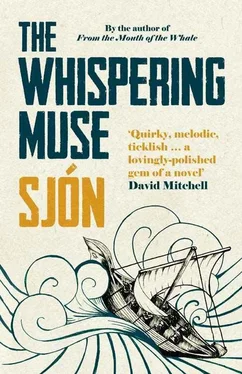AT ELEVEN O’CLOCK on the morning of 10 April 1949 the merchant ship MS Elizabet Jung-Olsen departed the free port of Copenhagen en route to Norway, bound for Mold Bay in the county of Vest-Agder. My quarters on board consisted of two spacious cabins amidships on the port side below the bridge, the outer room entered from the saloon. This cabin contained every conceivable comfort: a berth and chairs, desk, cupboards and book-shelves, all as neatly made as one could wish for. The inner cabin consisted of a bathroom with a china wash-basin, a mirror as long as the space permitted and a deep bathtub on bronze feet shaped like the claws of a dragon or lion (one can’t always tell them apart). Opening off the bathroom was a roomy closet containing a modern WC. I couldn’t help thinking that it would be interesting to see the captain’s quarters, given the comfort of the accommodation afforded to the ‘supernumeraries’, as they call those who are over and above the crew.
Well, I was now extremely glad that I had dropped by at my benefactor’s headquarters on my way to the ship that morning to deliver a letter of thanks. I had worked on its composition far into the night, making three drafts before the final clean copy, for in addition to conveying my gratitude, I wished heartily to congratulate Mr Magnus Jung-Olsen on the success of his remarkable company.
I sat down by the porthole and looked out over the sound. The sky was overcast, a stiff northerly breeze sending a considerable swell head on to the ship. The whistle blew from time to time, at lengthy intervals. Ahead nothing could be seen but the crests of the waves, slapping their white foam hither and thither as they swelled and subsided in turn. Sleet began to pelt from the sky and the view faded. I watched until I could no longer distinguish sky from sea, then lay down, worn out from my letter-writing the night before.
I set my alarm clock for 5 pm. The food on board the vessels of the Kronos line is famed throughout the shipping world and it is claimed that the Danish king borrows their chefs when His Majesty’s own ship’s cook is indisposed.

I was shown to a seat at the captain’s table, where Captain Alfredson introduced me to the first and second mates, the first engineer and the purser. There was a woman there too, the purser’s wife, I assumed, but later gathered that their marital status was somewhat irregular and it would be more correct to call her his lady friend. Apparently I was not to be the only supernumerary on this trip.
The woman, who had thick fair hair, was of below average height and stoutly built. She seemed half afraid of me, or at least inordinately shy. I thought she was goggling at me but later observed that this expression was habitual, for on closer acquaintance I noticed that in addition to large eyes set rather low in her face, she had a drooping lower lip that caused her to gape inadvertently between sentences. She was German or, by her own account, Polish by family and birth, or even Lithuanian, but apparently spoke German to her gentleman friend. She understood a little Danish but didn’t speak it as the couple had only been together three seasons. At this stage it didn’t occur to me to delve any further into her situation or life story as I assumed that there would be plenty of time for such things on the voyage. I asked the captain whether the purser normally brought along his ‘lady friend’. He said no. In reply to my question of how long the woman intended to remain with us he said that there were only two options, either she could disembark at Mold Bay or else go all the way to  zmit, because those would seemingly be our first two ports of call. But we would see how it went. I should mention that the purser was in his forties; a likeable chap, despite an inability to pronounce his ‘r’s, who could be described as good-looking were it not for the milky-white cataract in his right eye. His foreign mistress was about twenty years younger than him.
zmit, because those would seemingly be our first two ports of call. But we would see how it went. I should mention that the purser was in his forties; a likeable chap, despite an inability to pronounce his ‘r’s, who could be described as good-looking were it not for the milky-white cataract in his right eye. His foreign mistress was about twenty years younger than him.
There were seven of us in the saloon and plenty of room at the captain’s table. Everyone was friendly and did their best to make this first meal as congenial as possible. I myself was not feeling quite the thing after my afternoon nap; there seemed to be something wrong with the heating in my cabin because however far I turned on the radiator it remained obstinately cold, whether I turned the tap at the top or the bottom. After the cheery fat cook had announced the evening’s well-thought-out menu, I informed the captain of my problem. And also that when, having started up from my sleep around three, I went into the saloon and complained to the ship’s steward who was there polishing the dinner service, he had said that there were often small teething troubles with new ships, though of course this shouldn’t happen, and that this little hitch would be sorted out in no time. However, this had not been done and now, you see, I was rather dreading the onset of night. Captain Alfredson nodded during my speech but did not reply, keeping his own council, but then signalled to the engineer to see to the matter. The engineer asked the company to excuse him and rose from the table.
Now the meal commenced with one splendid dish succeeding another. They had not lied about the quality of the Kronos line cooking. What did attract my attention, however, was the fact that none of the dishes were fish. I thought to myself that this was probably coincidence and that we would have fish for the next four days as was customary in the Jung-Olsen family home. Anyway, it was all delightful and time passed far too quickly. The first engineer reappeared as we were finishing the most ambrosial ris à la mande that has ever passed my lips. He said he thought there was some grit in the radiator pipes, they must have come like that from the manufacturer, and he had ordered the third engineer to flush them out — or scrape them. I didn’t entirely follow the details of this repair story — to tell the truth I considered it rather inappropriate for the dinner table. At this point Spanish brandy was served, accompanied by Danish cigars in a hardwood box, and without another word on the subject, the first engineer applied himself to these refreshments. Different rules pertain at sea from on shore — here men must constantly tend to their lodging even while enjoying its protection.

Sailors who have been at sea for many years have a bottomless supply of tales about events they have either experienced first-hand or heard of from others of their ilk. In particular, it turned out that Caeneus, second mate of the MS Elizabet Jung-Olsen, was not shy about sharing with us various incidents that had befallen him in his day. He did so for the entertainment of his messmates, though they regarded it as an education too, since he had travelled further and seen more than any of them. From the anticipation that gripped my travelling companions I gathered that the second mate must be an outstanding storyteller, and I realised that they had been waiting for this moment throughout the meal.
I haven’t touched tobacco since my wife died, as I explained to the captain so he wouldn’t take it amiss when I declined his expensive cigars. However, I did accept another glass of brandy, then leant back in my chair and prepared to enjoy Caeneus’s seafaring yarn.
Before embarking on his tales the mate had the habit of drawing a rotten chip of wood from his pocket and holding it to his right ear like a telephone receiver. He would listen to the chip for a minute or two, closing his eyes as if asleep, while under his eyelids his pupils quivered to and fro. As this was the first time I had heard Caeneus talk, I smiled foolishly at his absurd performance. I could only assume that it was the prelude to some vulgar piece of clowning and mimicry, and I looked around, expecting to see the same reaction from my table companions — even to see the woman tittering. But they were sitting quite still in their seats, waiting for the story to begin. Even the purser’s lady friend watched enthralled as the man listened to the splinter of wood. My smile swiftly faded and in my confusion I darted a glance at Captain Alfredson who did me the courtesy of overlooking my faux pas . Abruptly leaning forward on his elbows, he said in a quiet, firm voice:
Читать дальше


 zmit, because those would seemingly be our first two ports of call. But we would see how it went. I should mention that the purser was in his forties; a likeable chap, despite an inability to pronounce his ‘r’s, who could be described as good-looking were it not for the milky-white cataract in his right eye. His foreign mistress was about twenty years younger than him.
zmit, because those would seemingly be our first two ports of call. But we would see how it went. I should mention that the purser was in his forties; a likeable chap, despite an inability to pronounce his ‘r’s, who could be described as good-looking were it not for the milky-white cataract in his right eye. His foreign mistress was about twenty years younger than him.










